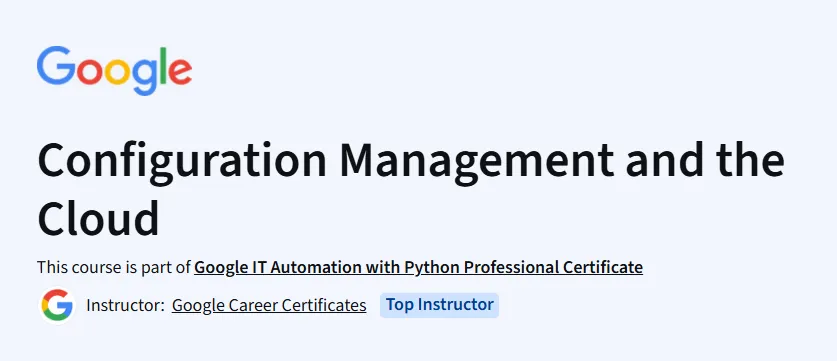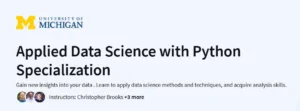What will you learn in Configuration Management and the Cloud Course
Understand automation at scale using configuration management principles like declarative, procedural, and idempotent techniques.
Use Puppet to manage a fleet of systems—install agents, write manifests, structure modules, and apply node definitions.
Automatically deploy and manage cloud-based instances at scale with scripting and metadata-driven CI/CD patterns.
Apply container orchestration fundamentals (Docker/Kubernetes) and execute GCP-specific management tasks like Cloud SQL configuration, startup scripts, and metadata operations.
Program Overview
Module 1: Automating with Configuration Management
⏳ ~4 hours
Topics: Definition and value of configuration management, infrastructure-as-code, Puppet basics, declarative vs procedural paradigms, factor info.
Hands-on: Set up Puppet master/agent locally, write simple manifests, and structure classes.
Module 2: Deploying Puppet
⏳ ~4 hours
Topics: Puppet resources, node definitions, module organization, facts collection with Facter.
Hands-on: Create and apply Puppet rules across nodes to enforce system state.
Module 3: Automation in the Cloud
⏳ ~4 hours
Topics: Scaling strategies, GCP metadata, startup/shutdown scripting, Cloud SQL configuration.
Hands-on: Use scripts and cloud-init metadata to configure VMs and Cloud SQL instances.
Module 4: Managing Cloud Instances at Scale
⏳ ~4 hours
Topics: Orchestration tools (Docker, Kubernetes intro), deploying containerized workloads, CI/CD considerations.
Hands-on: Launch multiple cloud VMs, deploy containers, test global changes via Puppet automation.
Get certificate
Job Outlook
Prepares learners for DevOps, Site Reliability Engineer, or System Administrator roles that manage and scale cloud infrastructures.
Teaches widely-used tools and patterns (Puppet, Docker, startup scripts) essential for modern automation workflows.
Specification: Configuration Management and the Cloud
|
FAQs
- Basic Linux and IT automation knowledge is recommended.
- Labs involve Puppet, scripting, and cloud metadata operations.
- Absolute beginners may find initial modules challenging.
- Prior experience reduces time spent on troubleshooting labs.
- Helps learners grasp configuration management and cloud automation faster.
- Labs cover Puppet deployment, node management, and manifests.
- Configure cloud instances using metadata and startup scripts.
- Introduction to Docker and Kubernetes for orchestrating workloads.
- Hands-on exercises simulate real-world DevOps workflows.
- Reinforces automation at scale using cloud-native practices.
- Prepares for DevOps Engineer or Site Reliability Engineer roles.
- Supports System Administrator and Cloud Engineer positions.
- Skills are relevant for managing scalable cloud infrastructure.
- Focus on automation, Puppet, and container orchestration.
- Enhances credentials for enterprise-level cloud and DevOps teams.
- Focus is primarily on Puppet for configuration management.
- Introduces CI/CD patterns and cloud scripting.
- Modern tools like Ansible or Terraform are not deeply explored.
- Students may supplement with additional courses for broader knowledge.
- Provides a solid foundation for understanding automation principles applicable elsewhere.
- Total duration is ~16 hours across four modules.
- Each module includes 4 hours of lectures and hands-on labs.
- Beginners may require additional time for troubleshooting Puppet and cloud tasks.
- Flexible pacing allows integration with work or other commitments.
- Most learners complete it in 2–4 days with focused effort.





